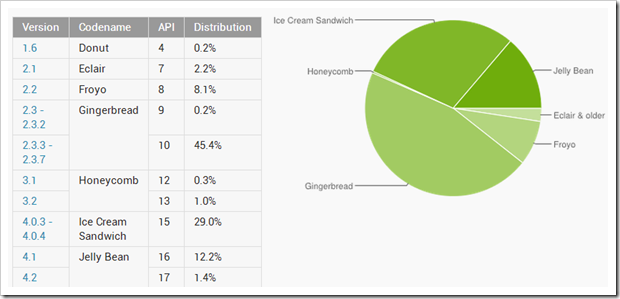We have all heard about Android Fragmentation. This is neither a myth nor as big a deal as made out. Basically, because of its open nature, the handset makers are free to upgrade the OS on the phones as per their convenience. [Current Android distribution percentages]

In contrast to that, as soon as a new version of iOS comes in the market, every iPhone in the market gets updated to it. Mind you, these iPhones (be it 4, 4S or 5) are the ones that Apple is currently selling. The support extends only so far.
All iOS updates are not the same as well. For example, iPhone 4 did not get Siri though it was updated to iOS 5. This might at first look feel like the update itself is useless if it does not give you the best thing about the OS. In many ways, it can itself be considered a fragmentation of the OS itself. Only the naming convention is kept but each phone is getting a different OS.
In this way, fragmentation is present in Apple too. There are two major differences though-
- All the supported phones (by Apple) do get the latest iOS.
- The time lapse between the release of OS and its update on the phone is less.
How does this change situation you might ask. Well, for first, an OS is not just the a few cool features that weren’t present earlier. In fact, most of the time, it is under the hood features that are more important.
For example, Windows Vista was worse than WinXP in a lot of ways. It was slower and what not. Despite this, it was definitely more secure than WinXP (which in turn was better than Win95 or 98). This is true for Mobile OS as well.
Now, a phone might not be able to run 60 fps that are up for offer in Jelly Beans but if the phone is in the market and is supposedly still supported, then it should at least get all the security features of the latest OS. Once, a new OS is launched, even with best efforts only patches can be delivered for the old OS.
In the (Android) mobile world, this issue is twice as bad. As the version 4.2 is in the market, it is quite difficult to maintain a 2.3 (Gingerbread). Ironically, it is the current most used OS. Worse, some cheap phones that are even launched recently have this on their phones. Security is a major issue in such cases.
With mobiles becoming the go to device for everything, they practically hold all the information about a person. In many ways, a mobile is a more powerful device to get hold of than a man’s computer. In such a situation, it is very important to have the phone updated to every security measure possible and not just a few patches here or there.
Also, the phones that can be upgraded should get the update as fast as possible. Preferably, Google should work with the OEMs so that the testing occurs before the OS is launched. At least the flagships deserve a better response time. The launch of Android 5.0 is around the corner and many phones are still not on 4.1 let alone 4.2.
Cool features aside, the true reason for quick update to latest OS should be security. UI is important but with the amount of sensitive information a phone holds, mobiles should get the best possible security, be it any OS version.
No comments:
Post a Comment